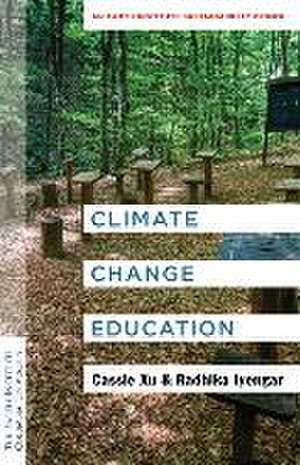Climate Change Education – An Earth Institute Sustainability Primer: Columbia University Earth Institute Sustainability Primers
Autor Luo Cassie Xu, Radhika Iyengaren Limba Engleză Paperback – 4 dec 2023
| Toate formatele și edițiile | Preț | Express |
|---|---|---|
| Paperback (1) | 119.69 lei 3-5 săpt. | +11.20 lei 7-13 zile |
| Columbia University Press – 4 dec 2023 | 119.69 lei 3-5 săpt. | +11.20 lei 7-13 zile |
| Hardback (1) | 471.32 lei 6-8 săpt. | |
| Columbia University Press – 4 dec 2023 | 471.32 lei 6-8 săpt. |
Preț: 119.69 lei
Nou
Puncte Express: 180
Preț estimativ în valută:
22.90€ • 23.91$ • 18.95£
22.90€ • 23.91$ • 18.95£
Carte disponibilă
Livrare economică 15-29 martie
Livrare express 01-07 martie pentru 21.19 lei
Preluare comenzi: 021 569.72.76
Specificații
ISBN-13: 9780231202435
ISBN-10: 0231202431
Pagini: 184
Ilustrații: 5 figures, 4 tables
Dimensiuni: 140 x 216 x 11 mm
Greutate: 0.27 kg
Editura: Columbia University Press
Seria Columbia University Earth Institute Sustainability Primers
ISBN-10: 0231202431
Pagini: 184
Ilustrații: 5 figures, 4 tables
Dimensiuni: 140 x 216 x 11 mm
Greutate: 0.27 kg
Editura: Columbia University Press
Seria Columbia University Earth Institute Sustainability Primers
Cuprins
Acknowledgments
Introduction
Part I. Why Climate Education Needs Systems Thinking
1. Defining Systems Thinking and Climate Change
Part II. Climate Change Education and Future Workforces
2. Systems Thinking Skills and Outcomes
3. Strategies in Instructional Design
Part III. Examples and Case Studies of Climate Change Education in Practice
4. Climate Change in Formal Learning Environments
5. Community-Based (Informal) Education
6. Teaching Climate Change in Nonformal Settings
Part IV. The Future of Climate Education
7. Diversity, Equity, Inclusion, and Access as a Tool for Addressing Social and Environmental Justice
8. Role of the Columbia Climate School in Climate Education
Conclusion
Notes
Index
Introduction
Part I. Why Climate Education Needs Systems Thinking
1. Defining Systems Thinking and Climate Change
Part II. Climate Change Education and Future Workforces
2. Systems Thinking Skills and Outcomes
3. Strategies in Instructional Design
Part III. Examples and Case Studies of Climate Change Education in Practice
4. Climate Change in Formal Learning Environments
5. Community-Based (Informal) Education
6. Teaching Climate Change in Nonformal Settings
Part IV. The Future of Climate Education
7. Diversity, Equity, Inclusion, and Access as a Tool for Addressing Social and Environmental Justice
8. Role of the Columbia Climate School in Climate Education
Conclusion
Notes
Index






